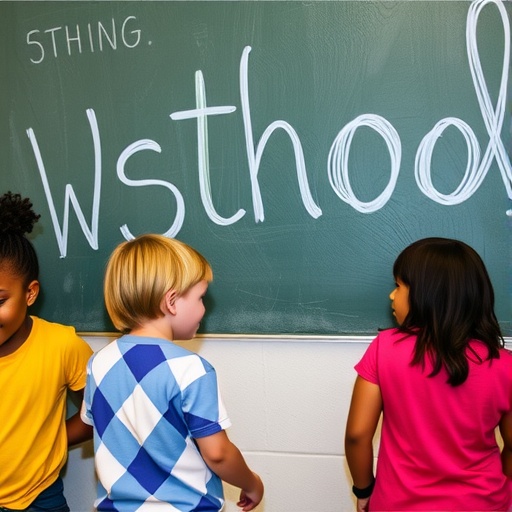The landscape of education in the modern era increasingly recognizes the paramount importance of mental health. Academic success is inextricably linked to emotional and psychological well-being, making the exploration of mental health interventions in school settings particularly critical. A groundbreaking study, authored by Holmes, S.R., Santiago, R.T., and Liu, C.A., undertaken within the esteemed confines of “School Mental Health,” tackles this crucial subject head-on. Their research delves into innovative modifications to existing school-based mental health interventions, specifically for students deemed at an enhanced risk for social, emotional, and behavioral disorders. As schools grapple with an unprecedented rise in mental health challenges among students, this study represents a timely and essential contribution to the field.
Through a comprehensive examination of existing intervention frameworks, the authors meticulously parse out areas ripe for enhancement. One of the pivotal findings of their research highlights that many traditional approaches cater broadly to the student population without adequately addressing the unique needs of those at risk. This misalignment can lead to the underutilization of available resources or, worse, a failure to engage these vulnerable students effectively. By zeroing in on the distinctive challenges faced by these individuals, the authors advocate for tailored strategies that consider the multifaceted nature of their experiences.
The authors underscore the importance of creating an inclusive environment in which every student’s needs are acknowledged and met. This principle serves as the foundation for their proposed modifications to existing mental health interventions. Their approach places a pronounced emphasis on integrating training for educators, ensuring they are well-equipped to identify signs of mental distress. In doing so, educators can serve not just as facilitators of academic learning but as pivotal figures in the mental well-being of their students.
Moreover, the researchers highlight the benefits of longitudinal studies, which allow for the tracking of individual progress over time. Such an approach ensures that interventions maintain their relevance and efficacy as students grow and their circumstances evolve. The need for continuous adaptation is critical in any educational setting, as what works for one cohort may not necessarily resonate with another. This responsiveness underpins the very essence of mental health support and intervention in schools.
In discussing the implementation of these modified interventions, the authors delve into the significance of collaboration between various stakeholders. Engaging parents, mental health professionals, and community organizations creates a supportive framework that can disseminate resources and strategies effectively. When students perceive that their entire community is invested in their well-being, they are more likely to seek help and embrace the mental health resources available to them.
Additionally, the research explores the role of technology in enhancing these interventions. In an age dominated by digital interactions, leveraging technology can facilitate easier access to mental health resources. For instance, virtual therapy sessions or mental health apps can provide students with the tools they need at their fingertips. This accessibility is particularly beneficial for students who may otherwise feel stigmatized or hesitant to reach out for help.
The findings of this study also echo broader societal trends in recognizing the validity of mental health challenges. This shift has sparked a conversation around the importance of normalizing mental health discussions within educational spheres. In this context, the authors advocate for embedding mental health literacy within the curriculum, enabling students to engage in conversations about emotional well-being openly. By fostering an environment where mental health is discussed and prioritized, schools can help destigmatize these essential health conversations.
The authors provide a clear call to action for educational institutions worldwide. They advocate for ongoing training and development for faculty, insisting that teachers must be equipped with the latest tools and knowledge to support their students effectively. Investing in professional development not only enhances teachers’ skills but also reflects a school’s commitment to prioritizing mental health and student welfare.
In closing, the research encapsulated in this article sheds light on the necessity of evolving mental health interventions within school systems. By focusing on the unique requirements of students at increased risk for social, emotional, and behavioral disorders, the authors propose actionable strategies that have the potential to reshape the landscape of school mental health. With educational systems facing unprecedented challenges, the need for tailored, responsive, and community-oriented mental health interventions has never been more urgent. This study serves as a pivotal framework for future discussions on enhancing mental health support in schools.
Ultimately, as we look towards the future, acknowledging the psychological well-being of students is not merely an additive aspect of educational reform but a foundational principle. The advancements and insights shared within this research pave the way for schools to not just educate but to nurture the holistic development of their students. Embracing and implementing these modifications could lead to significant enhancements in how schools address mental health challenges, making classrooms safer, more inclusive, and ultimately more conducive to learning.
Subject of Research: Modifications to School-Based Mental Health Interventions for At-Risk Students
Article Title: Exploring Modifications to School-Based Mental Health Interventions for Students Placed at Increased Risk for Social, Emotional, and Behavioral Disorders
Article References:
Holmes, S.R., Santiago, R.T., Liu, CA. et al. Exploring Modifications to School-Based Mental Health Interventions for Students Placed at Increased Risk for Social, Emotional, and Behavioral Disorders.
School Mental Health (2025). https://doi.org/10.1007/s12310-025-09792-9
Image Credits: AI Generated
DOI:
Keywords: mental health interventions, school-based, social and emotional learning, student well-being, at-risk students




